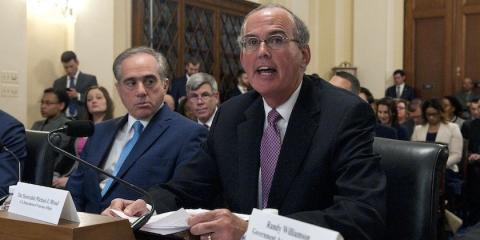In September, in what seems to be just the latest in a string of financial issues for the VA, the Inspector General of the VA released a memo detailing $90 million in overpayments to the middlemen who process payments to civilian providers contracted to provided care to America’s veterans under the VA Choice program.
In 2014, at the inception of the VA Choice program, the VA paid nearly $10 billion in no-bid contracts to two payment processing services, Triwest Healthcare Alliance and Healthnet Federal Services.
In exchange for this $10 billion, these two companies were supposed to verify that charges were valid and shouldn’t be billed to private insurance, and then -- if no issues were found -- pay the doctors in a timely manner and bill the VA.
The VA would then verify that the middlemen had done their jobs and cut their checks. But, according to the IG’s memo, that’s not what happened.
For a number of reasons, long wait times and subpar care among them, the VA Choice program has been very popular. Because of this, the VA got behind in conducting their audits, prompting providers to start screaming that they weren’t getting their payments timely enough.
This caused corners to be cut, and eventually led to a change in 2016 in the way payments were processed. It was changed to more of a “bulk payment” type system. But within this system, there was much less oversight happening in favor of speedy payments.
“Making accurate and timely payments in the Choice Program has proven to be a significant challenge for VA,” the memo said.
The IG’s memo went on to detail issues within the VA’s payment system, problems that persisted even after the department employed new, and presumably costly, claims software, called Plexis Claims Manager, designed to cut down on these costly errors, though the system still requires a significant amount of manual work.
“VHA’s claims payment activities are similarly burdened by lack of automation, multiple systems that are not integrated, and a significant amount of manual work… In addition, non-VA providers do not have visibility into the status of their claims… Overall, the high reliance on manual processes slows payments activities, introduces potential errors (e.g., lost claims and misrouting of claims), and introduces waste into the process,” the memo said.
Even under the change in 2016, audits were still supposed to be conducted to ensure that there was no waste, fraud, or abuse. Nearly two years later, no audits have begun. The VA said they would hire a private contractor for this, but this has yet to happen either.
It’s worth mentioning that Healthnet Federal Services also processes payments to civilian providers for Tricare, the military’s health insurance system.
Triwest Healthcare Alliance did the same until 2011, when allegations of rampant fraud cost them the contract with Tricare and forced them to pay $10 million in settlement to the Justice Department.
Triwest is currently under investigation for wire fraud and misuse of government funds unrelated to the overpayments detailed in the VA IG’s report.
The payment processing services are required by law and by the conditions of their contracts to repay any overpayments that they receive; however, it is unknown when this money will be repaid.
It is expected to take several months for authorities to determine the appropriate repayment process, and determine any potential claims for damages that the government may have against Triwest Healthcare Alliance or Healthnet Federal Services.
While it’s common knowledge that waste, fraud, and abuse is a significant problem within the government, this matters more now because in October, VA Director Shulkin went in front of Congress and asked for more money to pay the costs of civilian medical care for veterans, saying the program would run out of money before the end of the year.
